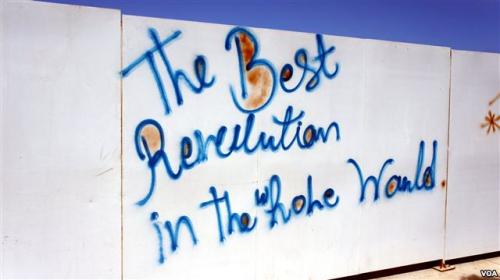Arab Spring Still a Work in Progress
As Egyptians mark the second anniversary of their revolution, experts are assessing the actual impact of the Arab Spring, which many people expected to transform the Middle East.

Anti-Gadhafi and proud: Libyans chronicle their uprising in Tripoli.
The Egyptian revolution was a time of great hope and enthusiasm among millions of Egyptians.
But the second anniversary finds secular liberals protesting what they see as excesses by the new Islamist-led government.
Multiple Arab Springs
The contrast is emblematic of the disappointment and conflict that followed the euphoria of the uprisings in Egypt, Libya, Tunisia and other countries.
“The word ‘revolution’ is a very romantic term,” said Stacy Gutkowski, a Middle East Expert at London’s King’s college.
“It conjures up images of something dramatic like the Berlin Wall falling. That isn’t what has happened in the region. These are rumblings, long-term rumblings. But not yet radical change.”
Gutkowski said people were bound to be disappointed, even where governments were overthrown. And the kind of dramatic change the North African countries have seen has not spread to other parts of the region, where activists face either lengthy violent conflict, as in Syria, or piecemeal changes meted out slowly by entrenched autocracies, as in the Persian Gulf states.
“To say that there is one Arab Spring is really a misnomer. In fact, there are three Arab Springs,” she said.
Source: Voice of America
- 404 reads
Human Rights
Fostering a More Humane World: The 28th Eurasian Economic Summi

Conscience, Hope, and Action: Keys to Global Peace and Sustainability

Ringing FOWPAL’s Peace Bell for the World:Nobel Peace Prize Laureates’ Visions and Actions

Protecting the World’s Cultural Diversity for a Sustainable Future

Puppet Show I International Friendship Day 2020

